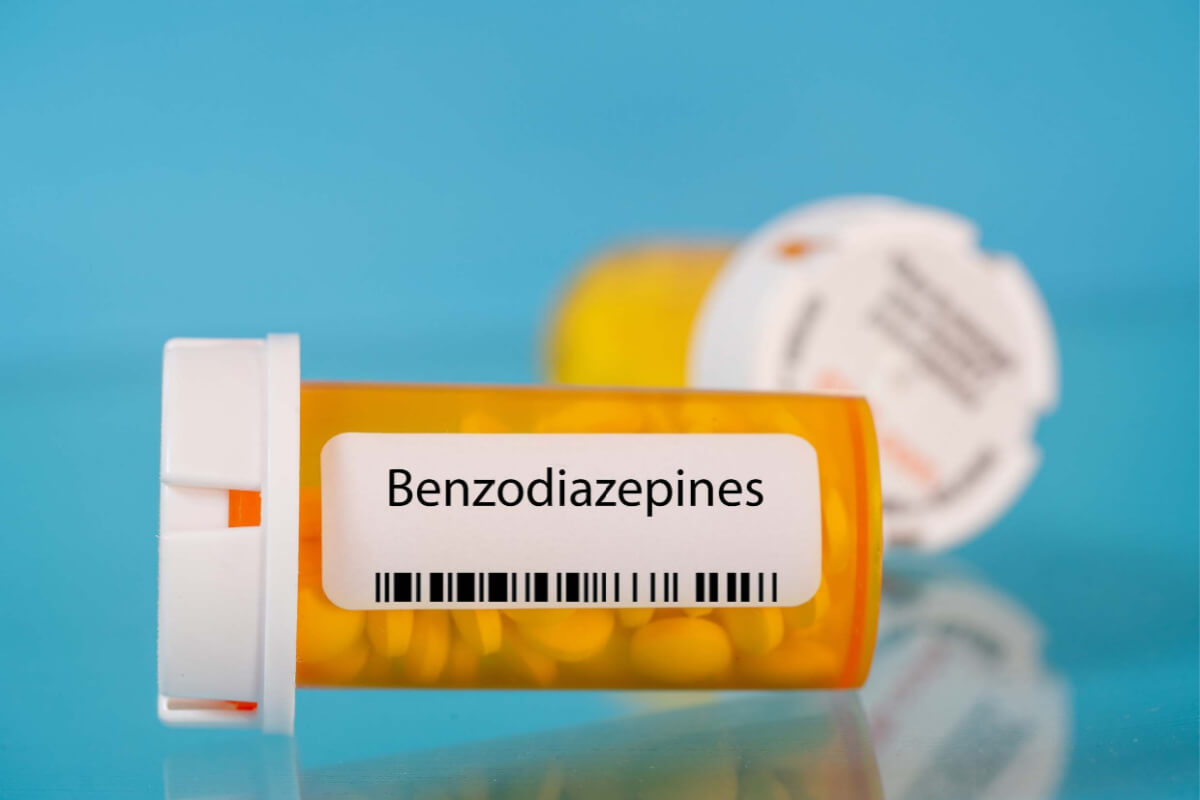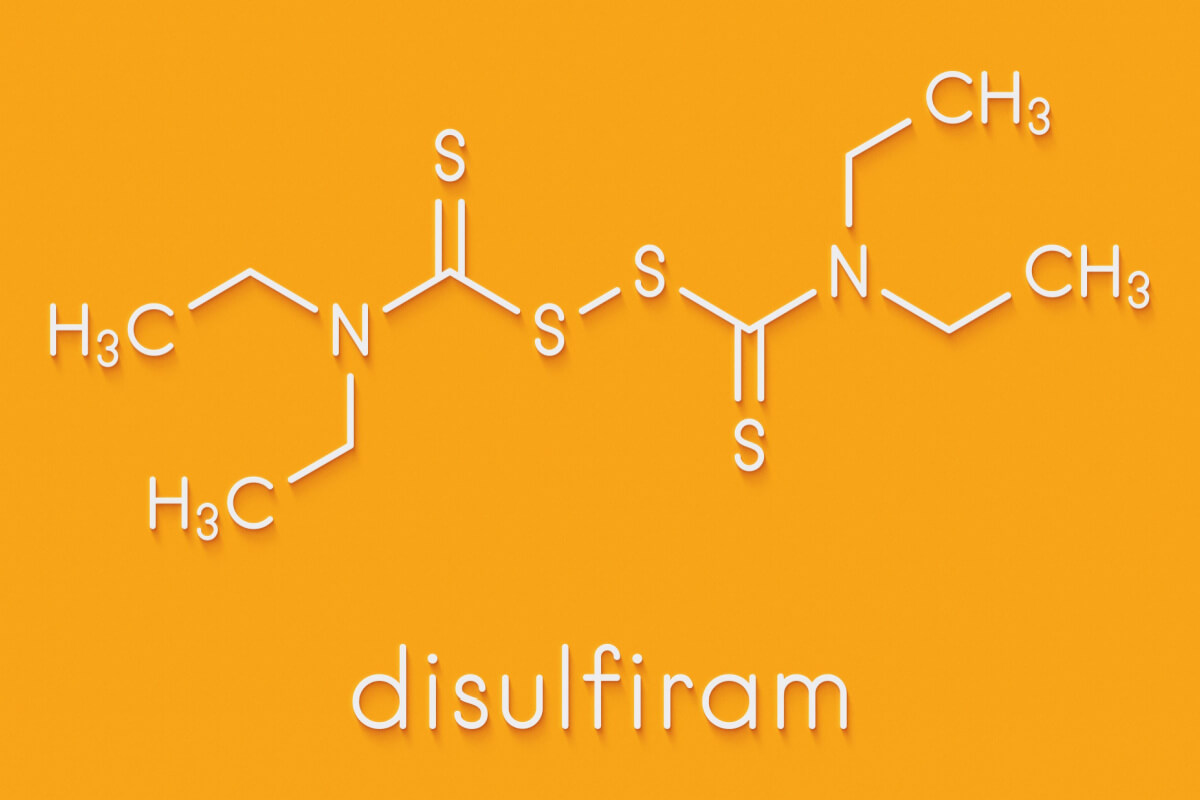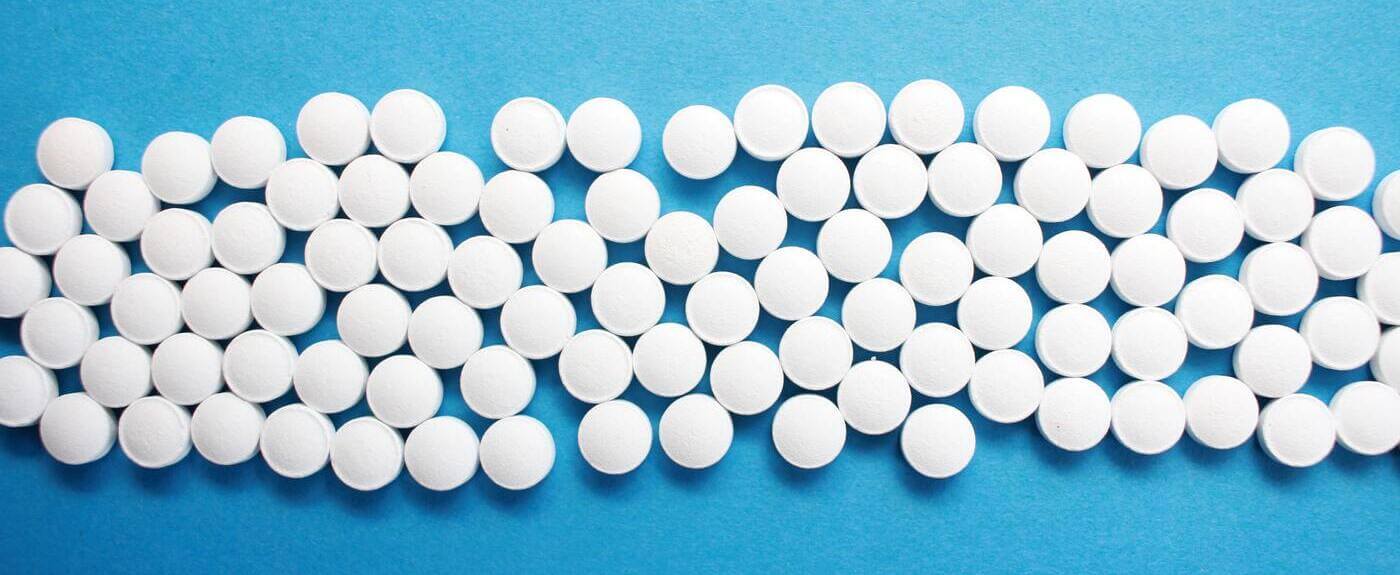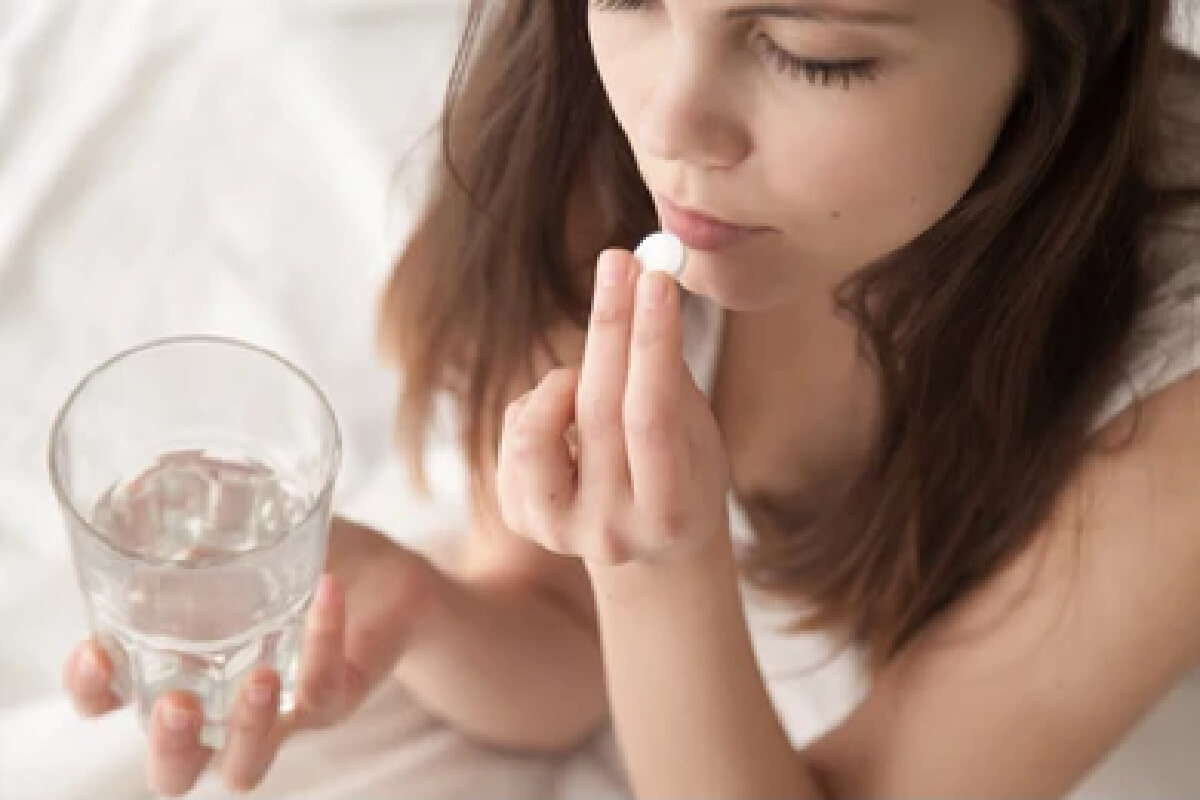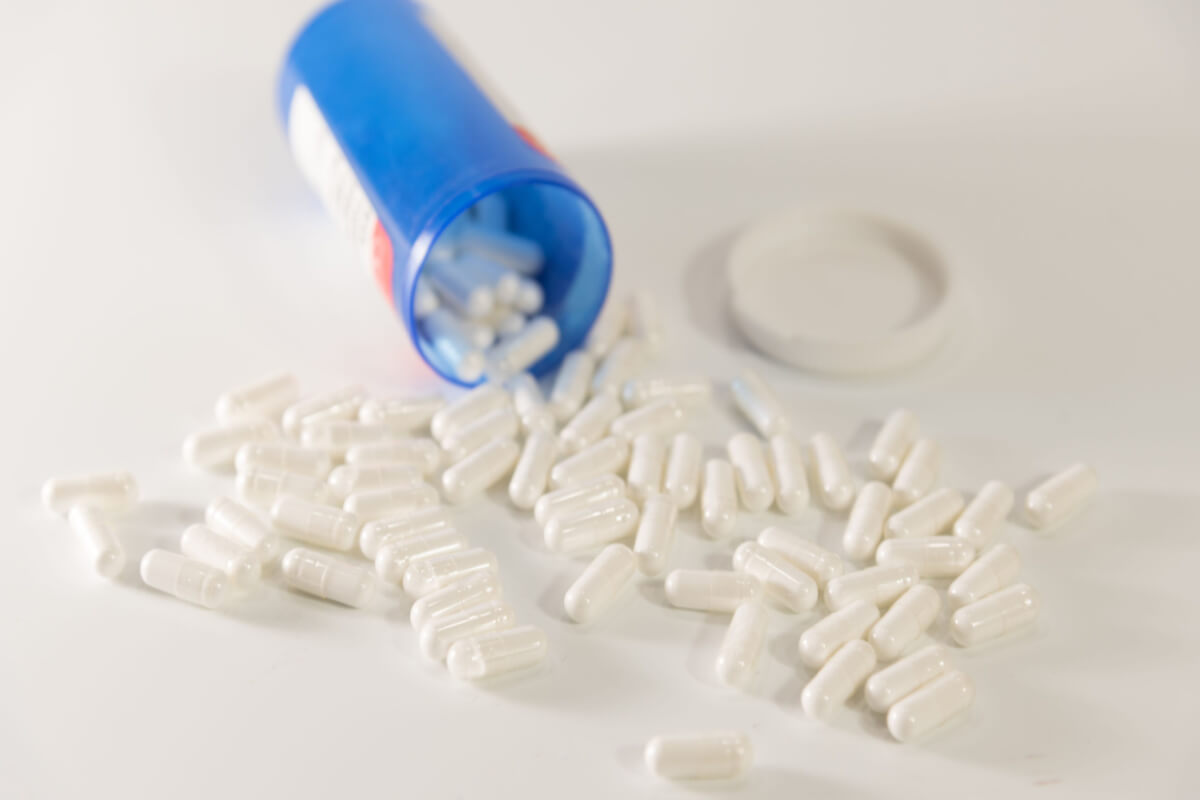Topiramate (Topamax and Topiragen) is a prescription medication approved by the U.S. Food and Drug Administration (FDA) to treat epilepsy and prevent migraines.[1] Some doctors also use topiramate off label to treat alcohol use disorder (AUD), as it can reduce cravings and ease alcohol withdrawal symptoms.
What Is Topiramate?
The FDA classifies topiramate as an antiepileptic (anti-seizure) medication.[2] It works by decreasing abnormal excitement between brain cells.
It comes in many forms, all oral, including a tablet, sprinkle capsule, long-acting capsule and solution. Sprinkle capsules and extended-release capsules are taken with food.
Topiramate (Topamax) is also prescribed to treat alcohol use disorder due to its ability to decrease alcohol cravings and reduce drinking. It is used off label, which means it isn’t yet approved by the FDA for AUD; however, it is considered an effective and safe medication.
It’s important to note that topiramate is not used to manage alcohol withdrawal syndrome, which is best treated using benzodiazepines.
How Does Topiramate Work?
Researchers aren’t exactly sure how topiramate works in treating alcohol use disorder.[2] However, it has been shown to decrease cravings in people with alcohol addiction.
Chronic alcohol misuse acts on many neurotransmitters in the brain, including dopamine, serotonin, glutamine and gamma-aminobutyric acid (GABA). [5]
One possible reason for topiramate’s efficacy is that it may affect the dopamine reward pathways by interacting with glutamate receptors at various receptor sites, preventing dopamine release when someone drinks alcohol and thus, reducing the reward. At the same time, it’s theorized to enhance GABA, which may minimize alcohol withdrawal symptoms. [5]
By breaking the connection between alcohol and pleasure while alleviating discomfort from withdrawal, topiramate may help treat alcohol use disorder.
How Effective is Topamax for AUD?
Some research has shown that topiramate may be an effective pharmacological treatment for alcohol addiction, while others have shown mixed results.
For instance, one study revealed that Topamax reduces the number of drinks per day, heavy drinking days, and the number of drinking days in people with AUD. [6]
Another study showed that participants who took topiramate had lower rates of anxiety and depression and a lower rate of relapse after four months. [6]
A 2011 study found that people taking topiramate along with other therapies had fewer alcohol cravings and withdrawal symptoms like depression and anxiety were improved. However, in this study, people were using other medications as well.[5]
A 2021 study helped reinforce Topamax’s ability to reduce compulsive drinking. Moreover, the researchers used brain scans to show that topiramate reduced the brain’s craving response when people look at images of alcohol. [7]
Still, not all studies have been positive. One clinical trial of 106 patients in a residential treatment program found no significant benefit of topiramate compared to placebo in reducing drinking. [10]
Topiramate Vs. Other Medications
Naltrexone, acamprosate and disulfiram are three FDA-approved medications for the treatment of alcohol use disorder, while topiramate is not yet approved and is considered an “off-label” medication.
According to American Family Physician, naltrexone (Revia or Vivitrol) and acamprosate (Campral) are the most effective medications for AUD, with significant and consistent high-quality evidence. [6]
Meanwhile, experts give topiramate and disulfiram a lower rating due to inconsistent or limited-quality evidence. That said, they still recognize that these medications may be beneficial for various people. [6]
Some doctors may use topiramate with other medications or by itself in patients who do not respond or cannot otherwise have one of these other medications. [3]
Who Can Use Topiramate?
The FDA lists no contraindications, or situations in which taking topiramate could be very dangerous.[2] Because topiramate has mostly been studied in people also using other FDA-approved medications for alcohol use disorder, it should probably be used this way.
But some doctors do use topiramate alone in patients who have not had success with or have not otherwise tolerated the other FDA-approved medications for AUD.
How to Take Topiramate
Your doctor will prescribe topiramate and explain how and when to take it. Often, people are instructed to take their medications with food, so the drug doesn’t cause stomach upset.
Follow your doctor’s instructions carefully. If you miss a dose, take it when you remember. But if it’s close to time for your next dose, skip the missed one. Don’t take two at the same time.
Take the medication as long as your doctor tells you to.
Side Effects & Risks
Topiramate is generally safe and well tolerated but can cause side effects, including dizziness and “brain fog.” [1],[2]
Other known side effects of topiramate include decreased appetite and some weight loss. [1],[2]
Less common side effects include the following: [1],[2]
- Back, bone and muscle pain
- Changes in the ability to taste
- Changes to menstruation patterns
- Unusual bleeding and bruising
- Constipation
- Dry mouth
- Headache
- Drowsiness
- Numbness, burning or tingling of the hands and feet
- Teary or dry eyes
- Diarrhea
- Weight loss
- Nervousness
Again, topiramate is not FDA-approved for treating AUD. Its use for this purpose still requires more research. However, many clinicians use it frequently for many conditions, including AUD. Current research seems to suggest it is a safe and potentially effective AUD treatment.
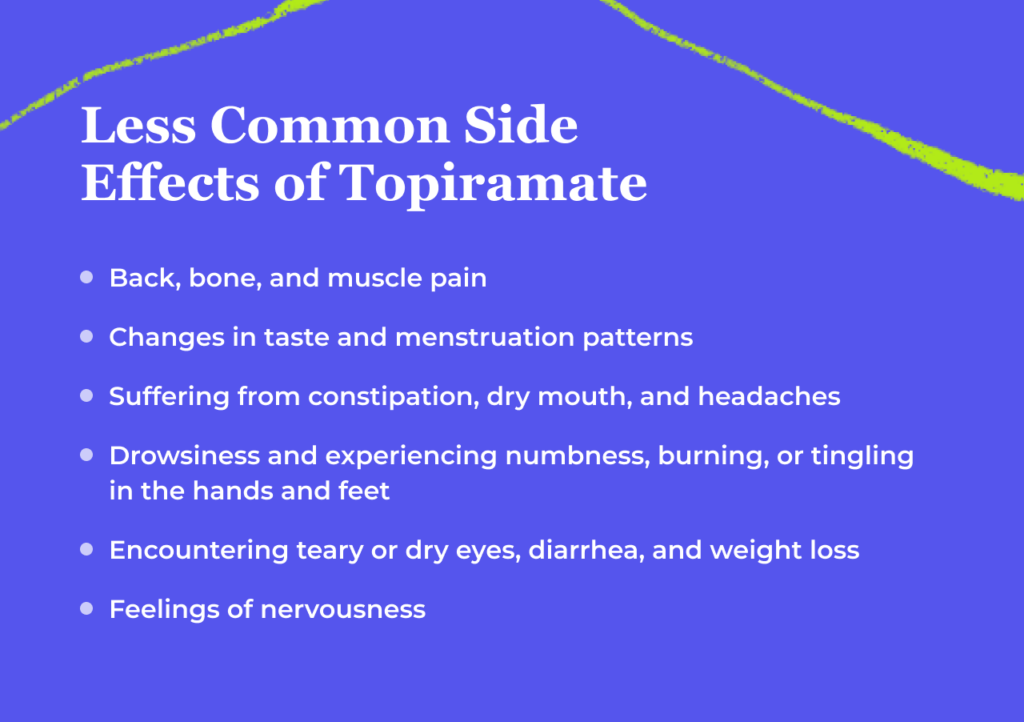
What Happens if You Mix Topiramate and Alcohol?
Drinking while you take topiramate could be very dangerous. Mixing alcohol and Topamax could lead to profound sedation or central nervous system (CNS) depression with effects like drowsiness, slowed breathing and loss of consciousness. [1]
Topiramate for AUD FAQs
Three FDA-approved treatments for AUD are naltrexone, acamprosate and disulfiram. [6] However, other medications, including topiramate, are often used off-label to treat AUD.
Unfortunately, no. While good medications exist to help treat AUD, they are woefully under prescribed. One study reported only about 1.6% of patients with likely AUD use medications.[9]
Several factors could be responsible for low medication use. Doctors may not screen for AUD or offer medications. Some people may not think to ask for them. And many people experience barriers to quality treatment.
The fact that so few people receive these approved medications is an urgent issue. More needs to be done to improve patients’ ability to get treatments proven to help them combat AUD.

Reviewed By Peter Manza, PhD
Peter Manza, PhD received his BA in Psychology and Biology from the University of Rochester and his PhD in Integrative Neuroscience at Stony Brook University. He is currently working as a research scientist in Washington, DC. His research focuses on the role ... Read More
- Topamax Prescribing Information. U.S. Food and Drug Administration. https://www.accessdata.fda.gov/drugsatfda_docs/label/2017/020505s057_020844s048lbl.pdf. May 2017. December 2023.
- Topamax Prescribing Information. U.S. Food and Drug Administration. https://www.accessdata.fda.gov/drugsatfda_docs/label/2012/020844s041lbl.pdf. October 2012. December 2023.
- Oral Topiramate Reduces the Consequences of Drinking and Improves the Quality of Life of Alcohol-Dependent Individuals: A Randomized Controlled Trial. Archives of General Psychiatry. https://pubmed.ncbi.nlm.nih.gov/15351769/. September 2004. Accessed December 2023.
- Topiramate Reduces the Harm of Excessive Drinking: Implications for Public Health and Primary Care. Addiction. https://pubmed.ncbi.nlm.nih.gov/17034435/. November 2006. Accessed December 2023.
- Treatment of Alcohol Dependence With Low-Dose Topiramate: An Open-Label Controlled Study. BMC Psychiatry. https://www.ncbi.nlm.nih.gov/pmc/articles/PMC3062593/. March 2011. Accessed December 2023.
- Medications for Alcohol Use Disorder. American Familyl Physician. https://www.aafp.org/pubs/afp/issues/2016/0315/p457.html. 2016. Accessed December 2023.
- Effects of Topiramate on Neural Responses to Alcohol Cues in Treatment-Seeking Individuals With Alcohol Use Disorder: Preliminary Findings From a Randomized, Placebo-Controlled Trial. Neuropsychopharmacology. https://www.nature.com/articles/s41386-021-00968-w. February 2021. Accessed December 2023.
- Exploring Treatment Options for Alcohol Use Disorders. National Institute on Alcohol Abuse and Alcoholism. https://pubs.niaaa.nih.gov/publications/aa81/aa81.htm. 2010. Accessed December 2023.
- Few Are Prescribed Medications to Treat Alcohol Problems. National Institutes of Health. https://www.nih.gov/news-events/nih-research-matters/few-are-prescribed-medications-treat-alcohol-problems. July 2021. Accessed December 2023.
- Topiramate treatment for alcoholic outpatients recently receiving residential treatment programs: a 12-week, randomized, placebo-controlled trial. Drug and Alcohol Dependence. https://pubmed.ncbi.nlm.nih.gov/23906999/ July 2013. Accessed December 2023.
Download Our Free Program Guide
Learn about our program, its effectiveness and what to expect
Related articles
Imagine what’s possible on the other side of opioid use disorder.
Our science-backed approach boasts 95% of patients reporting no withdrawal symptoms at 7 days. We can help you achieve easier days and a happier future.

